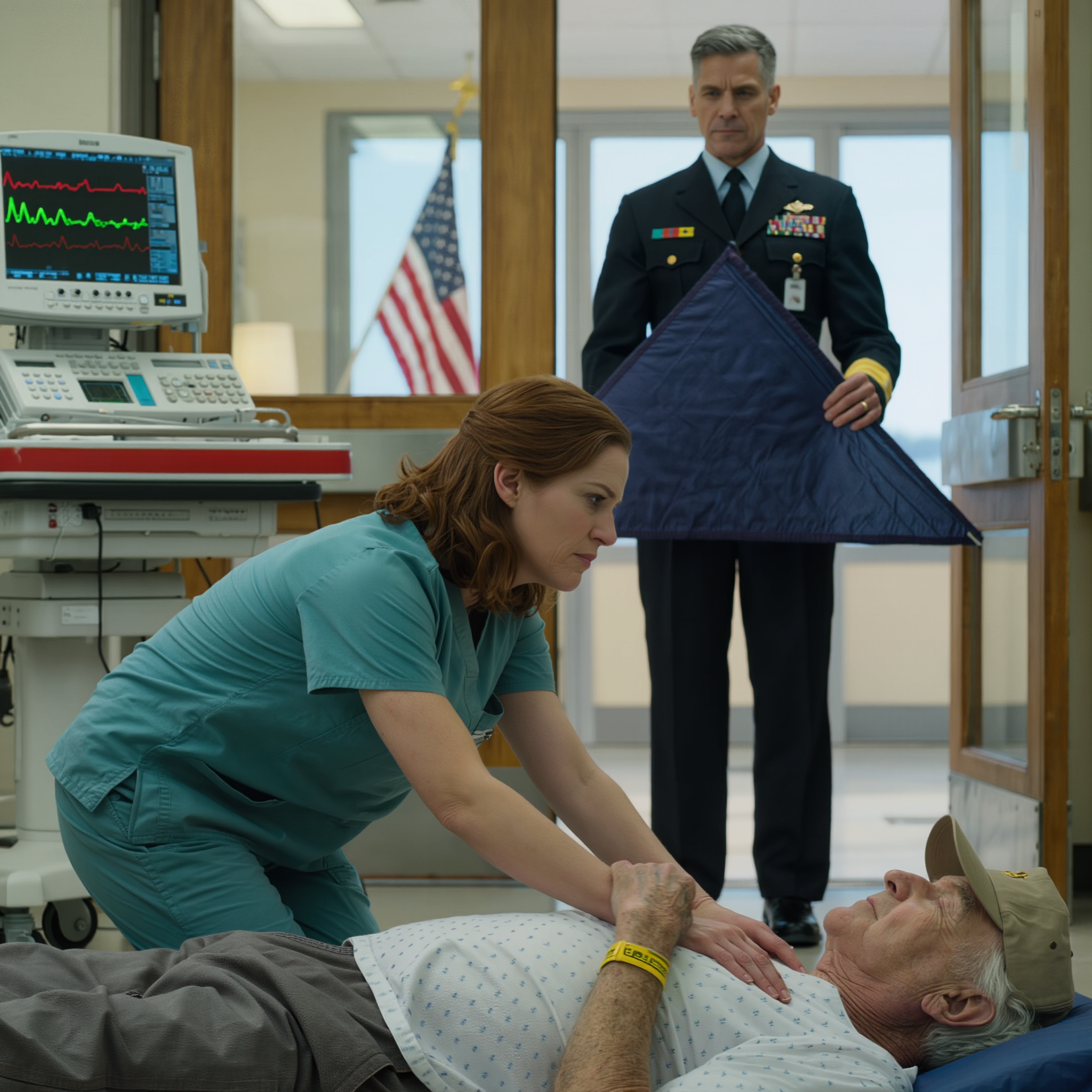
It began as an ordinary Tuesday morning at Saint Mary’s Hospital. Clara Reynolds, a 30‑year‑old nurse with six years of experience, was known for her meticulous adherence to protocol—but also for her unwavering belief that patients always came before paperwork.
Clara noticed the slight tremble in his hands as orderlies wheeled in the new transfer patient. Leonard Garrison, seventy‑eight, wore a faded veteran’s cap that had seen better days. A small oxygen tube ran beneath his nose, and his weathered face carried deep lines of a life fully lived. The medical chart indicated he’d been transferred for specialized cardiac care after a series of concerning episodes.
As Clara passed by—clipboard in hand, reviewing another patient’s medication schedule—she heard it: the distinctive alarm of a heart monitor flatlining. She turned to see Leonard’s body go rigid. The orderlies froze, uncertain. No doctors were present in the hallway.
Without hesitation, Clara dropped her clipboard. The sound of plastic hitting linoleum echoed through the suddenly silent corridor. She rushed to Leonard’s side, lowered the stretcher guardrail.
“Code Blue!” she shouted, her voice steady despite the adrenaline flooding her system. “Get a crash cart!”
Her hands found their position on Leonard’s chest—interlaced fingers, arms straight, shoulders aligned. She began compressions with mechanical precision.
One, two, three, four… She counted silently, maintaining the rhythm that might keep this stranger alive. Sweat beaded on her forehead as she reached ninety seconds. Her arms burned. Still no response.
“Come on,” she whispered. “Fight.”
After nearly two minutes—which felt like an eternity—Leonard’s chest suddenly heaved on its own. A weak but definite pulse returned. Clara stepped back, her scrubs damp with perspiration, her arms trembling from exertion.
That’s when Supervisor Margaret Walters appeared, face contorted with bureaucratic fury. She didn’t ask about the patient’s condition or acknowledge the life just saved.
“Who authorized you to intervene?” she demanded, her voice cutting through the tense atmosphere. “This patient isn’t assigned to your ward. You’ve violated protocol.”
Clara stood speechless, still catching her breath, as Margaret confiscated her ID badge.
“You’re suspended pending review. Clear out your locker.”
Clara looked once more at Leonard—now breathing steadily—as the emergency response team finally arrived. She nodded slightly, then walked away, her footsteps echoing in the suddenly silent hallway.
Stories like this exist because of people like you. Stay with us and help spread what’s right.
Clara sat alone in the staff break room, staring at her reflection in the coffee she hadn’t touched. The suspension notice lay beside her: effective immediately. The hospital administration had called an emergency review meeting in an hour. The charge: unauthorized medical intervention outside her assigned responsibilities.
Through the glass walls she could see her colleagues casting sympathetic glances, but most averted their eyes. Hospital politics. Nobody wanted to be next. Her phone buzzed—a text from Nurse Jenkins: You did the right thing, but they’re scared of liability. Don’t expect support from management.
Clara slipped her phone back into her pocket. Six years of spotless performance reviews, countless lives touched—and now her career hung in the balance because she had refused to watch a man die.
The meeting room felt unnecessarily cold when Clara entered. Five faces looked up: director of nursing, hospital administrator, legal counsel, HR representative—and, of course, Supervisor Walters. No allies.
“Miss Reynolds,” the administrator began, shuffling papers importantly. “You understand why we’re here. Your actions this morning represent a serious breach of hospital protocol.”
“I performed CPR on a patient in cardiac arrest,” Clara replied, her voice quiet but unwavering. “There were no doctors present. The transport staff were not trained in advanced life support.”
“That wasn’t your determination to make,” Walters interjected. “He wasn’t your assigned patient. There’s a chain of command.”
“If I had waited for proper authorization,” Clara said, meeting the supervisor’s gaze directly, “Mr. Garrison would be dead right now. Is that the outcome you would have preferred?”
The room fell silent. From the corner of her eye, Clara noticed a man in a dark suit rise from his seat in the waiting area outside. He had been listening intently. He walked away quickly, phone already at his ear.
“This isn’t about preferences,” legal counsel spoke carefully. “It’s about liability and established protocols. When staff act beyond their assigned scope—”
“My scope is saving lives,” Clara said. “That’s what I was trained to do. That’s what I swore to do.”
The administrator sighed. “We’ll reconvene after reviewing the security footage. Until then, your suspension stands.”
What no one in that room realized was that the man who had been listening—the one who had slipped away to make a phone call—was retired Colonel James Garrison, Leonard’s younger brother, and he had heard everything.
In a quiet corner of the hospital lobby, James spoke urgently into his phone. “General, it’s Garrison. I need a favor.” His voice dropped lower. “Someone deserves protection and recognition. How quickly can you get here?”
Back in her locker room, Clara slowly packed her personal items: a framed photo of her graduation, a coffee mug gifted by a patient’s family. Small tokens of a career she had poured her heart into. She wondered how many lives would be lost to protocol and bureaucracy—how many split‑second decisions would be scrutinized by people who had never had to make them. She didn’t regret what she’d done. She would do it again, even if it cost her everything.
At precisely 11:00 a.m., the distinctive sound of polished dress shoes on linoleum turned heads throughout the hospital’s administrative wing. A tall figure in full military dress uniform moved with purpose through the corridors. Colonel Michael Harris—decorated combat veteran and current military liaison officer—carried a wooden box tucked under one arm and an official envelope bearing government seals in his hand. The medals on his chest caught the fluorescent light, each one representing moments of valor that few civilians could comprehend.
“I need to speak with your hospital director,” he informed the startled receptionist, his voice calm but brooking no argument.
“Immediately.”
The receptionist fumbled with the phone, eyes wide at the imposing figure before her. “Sir, may I ask what this is regarding?”
“It concerns a matter of honor,” the colonel replied, standing perfectly straight, his cap tucked precisely under his arm. “And a nurse named Clara Reynolds.”
Within minutes, Clara found herself summoned back to the same meeting room. This time, however, the atmosphere had changed dramatically. The hospital director herself had joined them, her usually confident demeanor noticeably subdued. At the head of the table sat Colonel Harris, his expression unreadable beneath decades of military discipline—weathered face revealing nothing but the gravitas of his purpose.
“I understand,” the colonel began, his voice carrying the weight of authority that needed no volume to command attention, “that Nurse Reynolds has been suspended for providing life‑saving care to Leonard Garrison.”
The director shifted uncomfortably in her leather chair, manicured fingers adjusting papers that didn’t need arranging. “Colonel, with all due respect, this is an internal hospital matter—”
“Leonard Garrison,” the colonel continued as if she hadn’t spoken, each word measured and deliberate, “is not just any patient.”
He opened the wooden box with reverent care, revealing a Purple Heart medal nestled against deep blue velvet. The medal gleamed under the conference room lights, its purple and gold a stark contrast to the sterile whites and blues of the hospital environment.
“Staff Sergeant Leonard Garrison served three tours in Vietnam. During his second tour, he carried four wounded men through enemy fire after their helicopter was shot down. With shrapnel in his leg and burns across his back, he returned to the wreckage three times, refusing evacuation until every man was accounted for. Two of those men are now surgeons. One is a congressman.”
The room fell silent. Even Supervisor Walters appeared to shrink in her chair, her previous righteousness evaporating like morning mist.
Colonel Harris slid a USB drive across the table. “I’ve taken the liberty of reviewing your security footage. It clearly shows that Nurse Reynolds was the only medical professional who responded appropriately to a life‑threatening situation. She followed every protocol for emergency intervention—exactly as she should have.”
The director inserted the drive into her laptop. The room watched in silence as the morning’s events unfolded on screen: Clara’s immediate response, the perfect form of her CPR technique, the precious minutes that passed before anyone else arrived to help.
“In the military,” Colonel Harris continued, “we have a saying: initiative in the absence of orders. It means taking the right action when there’s no time to wait for permission. It’s what we train our best for.” He turned to Clara. “Your actions embody the highest standards of medical care and human decency. You didn’t need to know Sergeant Garrison’s military record to know his life was worth saving.”
The hospital director cleared her throat. “In light of this additional context, I believe we should reconsider our position. Miss Reynolds’ suspension is lifted immediately.”
“That’s not enough,” Colonel Harris said firmly. “This woman deserves recognition, not apology. She exemplifies everything your hospital should stand for.”
The director nodded slowly. “You’re right. And we will address our emergency response protocols to ensure this situation doesn’t repeat itself.”
Supervisor Walters stared at her folded hands, unable to meet anyone’s eyes.
“Sometimes,” Colonel Harris said, rising to his feet, “the bravest thing isn’t running into combat. Sometimes it’s standing up to the people who should be on your side.” He extended his hand to Clara. “On behalf of the armed forces and the Garrison family, I thank you.”
As Clara shook his hand, she noticed something she hadn’t before: the colonel wore a medical service pin on his uniform. He had once been one of them.
“You don’t owe me an apology,” Colonel Harris told the hospital staff as he prepared to leave. “You owe her your gratitude. Some people don’t need authority—just the instinct to save lives.”
Subscribe to never miss stories about those who dare to do what’s right.
Three days later, Clara stood beside Leonard Garrison’s bed in the ICU. His eyes fluttered open, focusing slowly on her face. Recognition dawned in his weathered features.
“You’re the one,” he said, his voice a hoarse whisper. “My brother told me what happened.”
Clara adjusted his IV line. “Just doing my job, Mr. Garrison.”
Leonard’s hand—spotted with age but still strong—reached for hers. “I pulled men from burning helicopters,” he said. “Carried buddies through jungles when they couldn’t walk. Never once thought—” His eyes glistened. “Never thought someone would save me someday.”
Clara squeezed his hand gently. “That’s how it works. We look out for each other.”
Later that afternoon, Clara found Supervisor Walters waiting by the nurses’ station. The older woman’s usual rigid posture had softened, her eyes downcast.
“Nurse Reynolds,” she began, her voice uncharacteristically hesitant. “I owe you an apology. A public one.” She gestured toward the staff gathering for shift change. “May I?”
Clara nodded, uncertain what to expect. Walters cleared her throat, drawing the attention of the dozen nurses preparing for the evening shift.
“I want to acknowledge something important,” she announced. “Three days ago, Nurse Reynolds made a decision that saved a life. I responded by punishing her for it.” Her voice wavered slightly. “I was wrong, and I am sorry.”
To Clara’s astonishment, the head nurse continued: “From today forward, we’re implementing a new emergency response protocol—the ‘Clara Code’—authorizing any qualified nurse to initiate emergency procedures when a doctor isn’t immediately available.”
One by one, the nurses rose to their feet. The applause started slowly, then built until it filled the room. Clara felt her cheeks flush with unexpected emotion.
Dr. Morris, the hospital’s chief of medicine, appeared in the doorway. “Nurse Reynolds,” he called out above the applause, “the director would like to see you.”
In the director’s office, Clara was surprised to find both Colonel Harris and James Garrison waiting alongside hospital leadership.
“We’ve been reviewing our emergency response protocols,” the director explained, “and we’ve realized they’re inadequate—too focused on hierarchies, not enough on patient outcomes.” She handed Clara a folder. “We’d like you to head a committee to revise them. With your experience and moral clarity, you’re the right person to lead this change.”
As Clara left the office—her reinstated ID badge clipped securely to her scrubs—she paused to look through the ICU window. Leonard sat propped up in bed, his brother James beside him, both men laughing at some shared memory. She thought about the fine line between rules and purpose; about how systems designed to protect can sometimes do the opposite; and about the courage it takes to distinguish between them.
When Clara entered the ICU for her evening rounds, the usual bustle of activity briefly paused. But this time, the eyes that turned toward her held something new—not scrutiny or judgment, but respect. She nodded briefly, then turned to her patients. After all, they were why she was here. Some things hadn’t changed.
There are people trained to save lives, but not everyone has the courage to act when no one gives permission. Clara didn’t wait. Because of that, a life was preserved, a policy was rewritten, and a community learned what truly matters.
In a world often paralyzed by protocols and permissions, it’s easy to forget why those systems were created in the first place. They exist to save lives—not to prevent heroes from emerging. The hospital’s new “Clara Code Red” protocol wasn’t just about changing rules; it was about remembering the human heartbeat behind every regulation.
Leonard Garrison spent decades believing he was the one who saved others. It took Clara Reynolds to show him that courage flows in all directions—that sometimes the battlefield is a hospital corridor, and sometimes the enemy isn’t foreign. It’s our own fear of stepping outside the lines.
Perhaps the most profound victory wasn’t the one Clara won against hospital bureaucracy. It was the victory she won for every patient who would come after—those whose lives would now be saved because someone dared to rewrite the rules of permission when lives hung in the balance.
Sometimes the most heroic acts aren’t performed on battlefields but in hospital corridors. Sometimes the bravest decisions aren’t the ones that follow the rules, but the ones that remember why the rules exist in the first place.
Have you ever witnessed someone criticized for doing what was right? Share your story below. Subscribe to Q H Incredible Stories, where righteous actions are always told and honored the way they deserve.
“You weren’t authorized to touch that patient!” the supervisor snapped, as the nurse’s hands still trembled from CPR. “He wasn’t even on your shift!” But she was the only one who acted. The next morning, a high‑ranking officer entered the ICU carrying a folded American flag—and a question that brought the entire hospital to silence.
Ever seen someone punished for doing the right thing? Type 1 if you have.
There was a moment Clara kept replaying later—the noon hour on that first day. Between the morning’s meeting and the quiet humiliation of packing a locker she’d never imagined leaving, the hospital hum shifted. A door hissed open. Conversations thinned. Someone at the central station stood up so fast their chair skidded back.
A second uniform had arrived.
Brigadier General Elena Park, sleeves creased to a knife’s edge, stepped into the ICU holding a crisply folded American flag and a letter in an embossed folder. The fluorescent lights threw a lacquered sheen across the flag’s dark blue canton. She paused at the nurses’ station, removed her cap, and rested the triangle of stars against her forearm like a child carried close.
“I’m looking for Nurse Clara Reynolds,” she said, not loudly, but the ward heard her.
Clara stood. The room tilted in that odd way time does when two worlds brush shoulders—the clean-line world of policy and paperwork, and the messier, beating world of breath saved at the last second. General Park nodded.
“This flag was flown over the Capitol this morning at the request of Congressman Hale,” she said. “He served with Staff Sergeant Leonard Garrison and credits him with his life. He asked me to deliver this to the place where Mr. Garrison’s life was given back to him.”
The general set the flag on the counter with reverent care and opened the folder. “This is a Department of Defense Certificate of Appreciation to Saint Mary’s ICU—for exemplary initiative in patient rescue and for embodying the principles of service above self.” Her eyes moved to Clara. “And this letter, addressed to you.”
Clara broke the blue seal with hands that still remembered the press of sternum beneath her palms. The letter was short, handwritten in a firm block script that made each sentence feel like a promise.
You didn’t hesitate when it counted. I remember a night in 1970 when Leonard didn’t either. He carried me to a helicopter with a rotored sky on fire. I got to become a father and then a grandfather because of him. He got to keep being both because of you. — T. Hale
For a second, the ICU became a chapel. The hiss of oxygen, the rhythm of monitors, the far‑off rattle of a supply cart—they all seemed to fold into the white space of the letter. General Park waited as if inhabiting the silence with them.
“This flag should be displayed where people come to remember what matters,” she said. “If you’ll accept it.”
Clara looked at the triangle of stars. “It belongs to the unit,” she said softly. “To Mr. Garrison.”
General Park nodded. “He insisted it belong to this room.”
The charge nurse cleared a section of the glass case near the board. Someone brought a small stand. The flag went in, angled just so, blue field forward. It transformed the station—same computers, same pen cup, but now the kind of blue that means you were trusted with something.
By that afternoon, news crews would ask for statements the hospital declined to give. By the end of the week, the administrator would practice a new sentence in the mirror: Patient outcomes are our North Star. But at noon on that first day, a folded flag found a home, and nurses walking past it stood a half‑inch taller without meaning to.
Clara didn’t sleep much that night. Her apartment felt different, the quiet exaggerated. She washed her hands longer than usual—as if soap could scour away the way Walters’ voice had made her bones feel hollow—and then sat on the edge of her couch with the letter open on her knees. She thought about the first code she’d ever run: a 3 a.m. grocery clerk with a crooked nose and a receipt still stuck to his palm. She had been twenty‑four and shaking so hard that afterward she had to sit in the dark of a supply closet to stop the tremor. She thought about the man with the blue socks who smiled at her over orange Jell‑O and died before his daughter arrived. She thought about the way a body leans into your compressions when the heart is near enough to grabbing hold.
She texted Nurse Jenkins. Thanks for the message earlier. I’m okay.
Three dots appeared, vanished, appeared again. You’re more than okay. See you at 0700. Coffee’s on me.
In the morning, the hospital smelled like chlorhexidine and burnt coffee and something sweet from the volunteer cart. The flag in its case felt like a promise each time she passed it. Walters stood at the board with a legal pad and a look Clara had never seen on her face—uncertainty. She nodded once when their eyes met, the smallest of truces.
The “Clara Code” started as a handwritten note on the whiteboard: If no physician immediately present, nearest ACLS‑certified nurse initiates protocol. No prior authorization required in obviously life‑threatening scenario. It turned into a typed draft by lunch, then an email threaded with comments by the end of shift. Language was argued over like a scalpel—sharp and precise. Legal wanted shall. Nursing wanted must. HR wanted clarity on training intervals. Clara wanted seconds, because she understood what a minute costs.
During the first in‑service, Clara stood before a cluster of night‑shift nurses and transported aides who had never been asked what they noticed first in a crisis. She held a CPR feedback manikin, its sternum scuffed smooth by a hundred practice saves, and she said, “We’re going to talk about sacred seconds.”
Hands went up.
“What if a family member objects?”
“You’re covered under the new policy,” Clara said. “Begin. Document. Keep going.”
“What if the transport tech says to wait?”
“You’re the clinician in the room. Begin.”
“What if someone threatens to report me?”
Clara looked out at the faces—the tired, the kind, the already wounded by years of being told to be less than the instinct that had brought them here in the first place. “Let them. We’ll stand with you.”
Between sessions, Walters hovered, writing lists for supply drawers and defibrillator checks, adding laminated flowcharts where the eye would find them under stress. Once, she stopped beside Clara with her legal pad cradled like a shield.
“I lost a case,” she said without preface. “Two years ago. A resident pushed meds out of sequence. The patient died. The family sued. We wrote three policies to make it never happen again. I got addicted to rules.” She pressed her lips together. “Addictions make you smaller.”
Clara didn’t say it’s okay, because it wasn’t. She said, “We’ll write better ones.”
News of the policy traveled weirdly, as news does—a reporter’s tweet, a paragraph in a health‑care newsletter nobody read until everybody did, then a morning‑show segment splicing stock footage of ICU monitors with a headshot of Clara taken from her employee badge. Her phone filled with strangers’ messages. Some were angry in that particular way fear disguises itself. Most were simple:
My husband is alive because a nurse didn’t wait. My mother. My son. My wife.
She answered one at a time until the battery icon turned red and her eyes burned. Then she set the phone face down and went to work, because the person in bed four needed lasix and reassurance and the quiet story about the letter she kept folded in her scrub pocket.
A week later, the hospital cafeteria smelled like toast and disinfectant and steam trays when Dr. Morris slid into the chair across from her with two cups of coffee and an envelope he didn’t immediately offer.
“You ever think about management?” he asked.
“Every time I watch a manager bury a good idea in email,” Clara said, then regretted the edge in her voice. She added, “Sorry.”
“Don’t be,” Morris said. “I need that edge on a committee that’s mostly upholstery.” He pushed the envelope across the table. “We’re naming you chair of Rapid Response Revision. Stipend attached. Protected time. You’ll still run three shifts a week. Interested?”
Clara pictured a calendar that had never loved her, now stepping aside to make space. “I’m interested.”
They met on Thursdays in a too‑bright conference room that still smelled faintly of fresh paint. A respiratory therapist named Hallie drew flow diagrams like arias. A ward clerk named Devon mapped phone trees as if they were subway systems. Jenkins, who knew where every spare suction canister was hidden, became the person you wanted in a fire. Walters left her legal pad on the table and rolled her sleeves.
They argued good‑naturedly about path lengths and crash‑cart layouts. They debated whether to put the defibrillator on the left or right of the cart—a small thing until the worst minute of someone’s life. They fought for more simulation hours and won half of what they wanted and called it a start.
On a warm Saturday, the hospital hosted a small ceremony no one would have predicted in a place where budgets and billing usually took precedence over banners. Families of veterans drifted in, wearing hats that announced the ships they’d served on or the years they’d spent in sand the color of bone. Leonard sat in a wheelchair near the front, a blanket tucked around his legs even though the air was already soft with summer.
James stood to speak, his voice halting on the first sentence and then finding the easy cadence of someone who had talked men through fear before. He told a story about Leonard carrying him across a clearing where the ground bit back. He told a story about a sister who mailed letters with drawings inside and a mother who waited at a window.
“And this place,” he said, turning to the glass case with its fold of night and stars, “gave him back to me. To us.” He looked at Clara. “To himself.”
General Park presented a challenge coin—heavier than it looked, stamped with a crest—and placed it in Clara’s palm with a handshake that made the coin click against bone. “For initiative in the absence of orders,” she said, half‑smiling.
Clara kept the coin in her pocket for weeks, a small planet of weight settling her when a shift ran too long or when a family’s grief found the exact word for its size and laid it at her feet.
The policy rolled outward. A hospital two towns over called to ask for their template. Then one in the next county. Then a chain that owned seven facilities in three states. A risk manager in Ohio wanted to know if the language would survive deposition. A nurse educator in Arizona wanted the slides. Someone in Maine sent a box of whoopie pies with a note that said, We used your checklist today. A grandmother is going home.
Not every message was kind. An email arrived from a lawyer representing a patient who believed their father had been harmed by a nurse who “acted outside scope.” A podcast host invited Clara on for a debate with a man who had never wrapped his hands around a manikin and yet considered himself an expert on pressing questions of care. Clara declined and went back to the room where a teenager waited for his morphine and for someone to look him in the eye and call him by name.
On a rain‑slick Wednesday, Walters stopped by the ICU after hours and tapped the glass case as if testing the sturdiness of a window.
“I used to think the law was a moat,” she said. “But moats keep people out and drown the ones who fall in. The better metaphor might be a bridge.” She looked at Clara. “Thank you for reminding me how to walk across.”
Clara nodded. “Thank you for building with me.”
At home, the letter from Congressman Hale lived inside a cookbook on the top shelf where grease couldn’t find it. Sometimes Clara took it down and smoothed the creases and read the part about getting to be a grandfather and thought about the way courage can migrate—from a jungle to a hospital hallway, from one pair of hands to another, from one decade to the next like a vigil passed at shift change.
On the day Leonard went home, the corridor smelled like lilies and antiseptic. Volunteers lined the hall with little flags. A harmonica somewhere tried to remember the tune to “America the Beautiful” and mostly found it. Leonard lifted a hand that had once dragged a man through fire and waved as if boarding a ship.
“Keep doing what you do, kid,” he told Clara when she tucked his blanket just once more the way her grandmother had taught her with quilts and care. “Keep not asking permission when someone’s dying.”
“I will,” she said, and meant it harder than she’d meant anything in months.
Months later, after the headlines became footnotes and the flag case simply became part of the room the way a family photo becomes part of a kitchen wall, a letter arrived from the state board. It wasn’t a complaint. It was an invitation. Would she serve on a committee reviewing emergency nursing scope language for statewide guidance?
Clara laughed alone in her kitchen, the sound bouncing off tile like a released breath. She wrote back yes and printed the email and slid it into the cookbook beside the congressman’s note as if the two pieces of paper might keep each other company.
In the meeting downtown, a commissioner asked why nurses should have that level of autonomy. Clara told them about seconds. She told them about the way a chest gives under your palms when you’re in the right place, about the slight lift of a mask when a breath seals well, about the color that comes back into a face like a sky clearing. She told them about a flag in a glass case and the way it changes how you walk past it. She told them about a supervisor who had been wrong and then brave enough to say it out loud in front of everyone. She told them about Leonard.
When the guidance passed, the paragraph that mattered most was two sentences long. It said what the whiteboard had said that first morning with a marker that bled faintly on the edges: If a patient presents an imminent, life‑threatening emergency, any nurse trained and credentialed in the relevant interventions is authorized to act without prior physician order. Begin. Document. Continue care.
On the anniversary of the day everything went sideways and then upright again, the ICU staff brought cupcakes and taped a paper banner to the case with the flag. The sharpie handwriting leaned too far to the right, the way hands do when the heart is ahead of them. Someone put a small plastic heart on the counter that blinked red, a joke and a benediction.
Clara ran her hand along the glass. Behind her, the monitors kept time. In front of her, a new admit coughed, a new alarm trilled, a new family asked if they could bring a blanket from home. The day lifted its sleeve and offered its vein.





